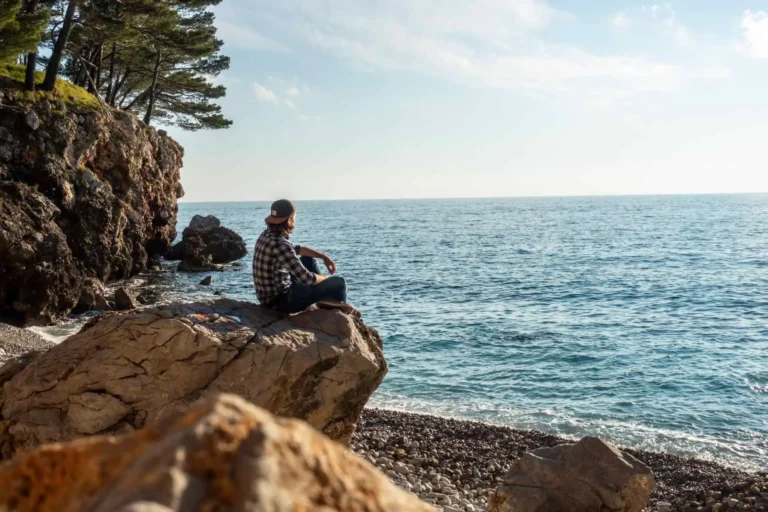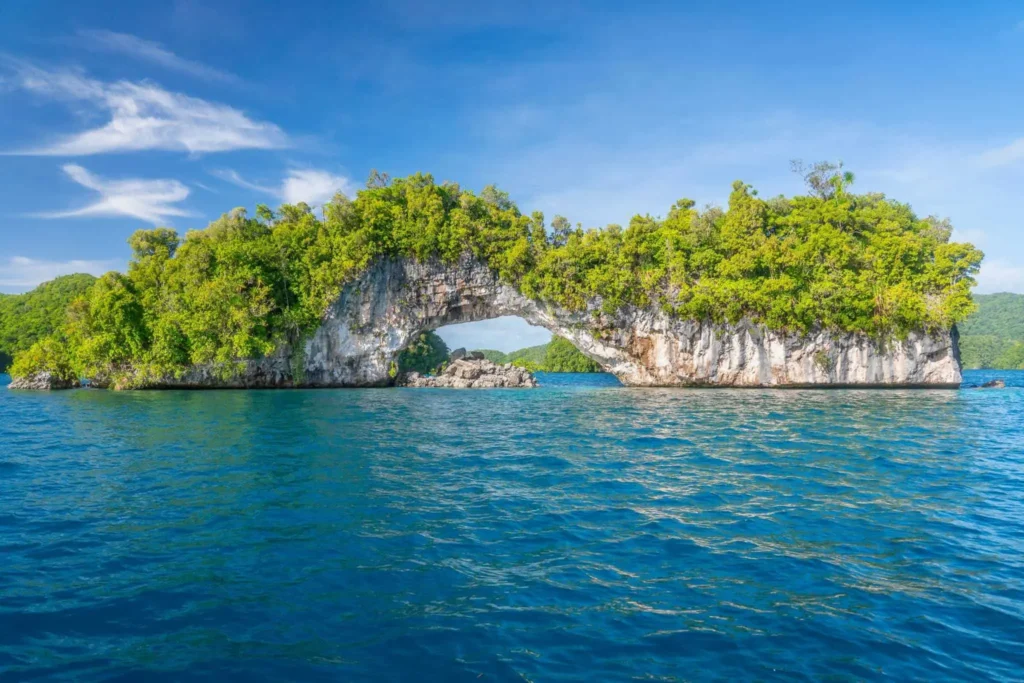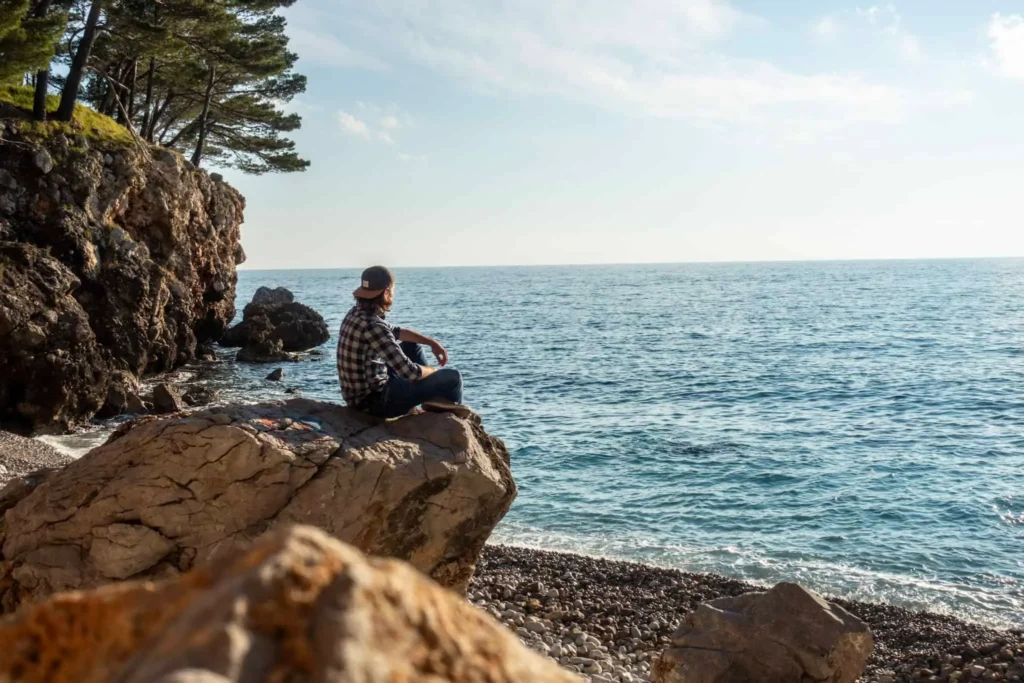| This post may contain affiliate links. Whenever you book or buy something through one of these, Giving Getaway gets a small commission, of which 100% will be donated to charity, without any extra cost to you! |
Travel is often seen as an escape from the stresses of everyday life, but what if it could be more than that? What if it could actually improve your mental health? Mindful travel is a form of travel that goes beyond simply visiting new places. It involves a conscious effort to immerse yourself in the present moment, fully engage with your surroundings, and cultivate a sense of awareness and gratitude for the world around you.
In recent years, there has been a growing interest in sustainable and responsible travel practices, as more people become aware of the impact of tourism on the environment and the local community.
However, what many travelers don’t realize is that traveling does not only allow us shaping the future of the destinations we visit through eco-friendly travel practices, but that it also gives us the chance to nurture our mental health and wellbeing. And that’s where ecotherapy and mindfulness practices come into play.
In this blog post, we will explore the intersection of these three key factors: ecotherapy, mindful travel, and responsible travel, and highlight how they can work together to enhance your travel experience while also supporting sustainable tourism.
What Is Ecotherapy?
Picture yourself in an idyllic setting, surrounded by a lush landscape and tranquil waters. The sun is shining brightly, birds are singing sweetly, and you feel deeply at peace with the world around you. This is what ecotherapy – or nature therapy – is all about.
Ecotherapy is a form of therapy that utilizes nature and the environment to improve mental health. It’s based on the idea that by connecting with natural elements, we can find greater balance in our lives. This type of therapeutic approach has been used for centuries, as it helps to reduce stress, increase mindfulness, and create an overall sense of wellbeing.
Many even believe that ecotherapy has incredible potential for treating anxiety disorders, depression symptoms, trauma recovery issues, and more complex psychological challenges like post-traumatic stress disorder (PTSD).
And indeed studies have shown that activities such as gardening and hiking help people become more aware of themselves and their surroundings which results in improved emotional regulation and better coping skills when faced with stressful situations.
Additionally, being outside increases exposure to sunlight which stimulates the production of serotonin – a hormone responsible for feelings of happiness and relaxation. Through regular engagement in ecotherapy activities, we can reap numerous benefits related to our psychological well-being.
Let us take a look at some examples of ecotherapy activities which can boost both your physical and mental health and which you can easily incorporate into your next trip.
Examples of Ecotherapy Activities While Traveling
The benefits of engaging in ecotherapy activities go beyond simply feeling relaxed or content; they provide us with the opportunity to learn about ourselves and the environment. The following activities can be done while traveling and help us build resilience against stressors back home, while at the same time allowing us to return refreshed.
- Spending time with animals: Animal-assisted activities (as long as ethical and responsible) involves interacting with animals, such as dogs, cats, horses, or even dolphins, to improve mental health. Animals can provide comfort, companionship, and a sense of connection, which can be particularly helpful for people with anxiety or depression.
- Forest bathing: Forest bathing, also known as Shinrin-yoku, is a Japanese practice that involves spending time in nature to improve mental and physical health. By immersing yourself in a forest environment and engaging all your senses, you can reduce stress and improve your mood.
- Hiking: Hiking is a popular ecotherapy activity that allows you to connect with nature and get some exercise at the same time. Whether you’re exploring local trails or embarking on a multi-day trek, hiking can help reduce stress and improve mental clarity.
- Beach time: Spending time at the beach is another ecotherapy activity that can be particularly effective for improving mental health. The sound of the waves, the feel of the sand between your toes, and the warmth of the sun can all contribute to a sense of calm and relaxation.
- Nature photography: Nature photography is a creative way to connect with nature and improve your mental health. By focusing on the beauty of the natural world, we can cultivate a sense of gratitude and appreciation that can help reduce stress and improve our mood.
- Outdoor yoga: Outdoor yoga is a great way to combine the benefits of yoga with the healing power of nature. By practicing yoga in a natural setting, you can improve your flexibility, strength, and mental well-being.
These are just a few examples of ecotherapy activities which you can practice while traveling and help to connect with nature as well as improve your mental health. Either consciously or subconsciously, most travelers feel drawn to natural wonders and feel the connection and the positive impact it has on them.
But this impact often doesn’t last long – and that’s where mindfulness comes into play.
What Is Mindful Travel?
Mindfulness is the practice of being present and aware in each moment without judgement. It’s an ancient concept that has been adapted to modern life by allowing us to become attuned with our inner feelings, emotions, thoughts, and bodily sensations.
Rather than focusing on where we are going or what might happen next, mindfulness encourages us to be mindful of the present moment and take time to appreciate our trip as we go along. By doing this, we can more easily manage our expectations and level of stress during a journey.
For example, instead of worrying about crowded airports or long lines at customs, taking some deep breaths and acknowledging our current situation can help create a calmer mindset for the rest of the trip.
Practicing mindfulness while traveling can promote clarity of thought and prevent overthinking potential problems before they arise. This allows us to focus on enjoying the experience rather than getting overwhelmed by anxieties about unknowns such as missing flights or dealing with language barriers.
Being mindful also enables us to better appreciate every aspect of our travels – something that might otherwise be missed when consumed in worries or distractions. This means that by utilizing the power of mindfulness when traveling, we can not only enjoy our experiences but also benefit from improved mental health throughout them.
Examples of Mindful Travel Practices
Mindful travel is about more than just reducing stress and anxiety – it is about being present in each moment of our trip. Here are three mindful travel practices which can help you to do so:
Slow Travel
Slow traveling is a mindful travel practice that emphasizes taking your time to fully immerse yourself in the destination and experience it at a slower pace. This means taking the time to enjoy the local culture, try the local cuisine, and connect with the people who live there.
By slowing down, you can reduce stress, improve mental clarity, and deepen your appreciation for the destination. Slow travel can also help reduce your carbon footprint by minimizing the amount of transportation you use, which is better for the environment.
Disconnecting from Technology
Disconnecting from technology is another mindful travel practice that can benefit your mental health. By unplugging from your devices and taking a break from social media, email, and other distractions, you can reduce stress and improve your focus.
This allows you to be more present in the moment and fully experience the destination without the constant stimulation of technology. Instead of scrolling through your phone, take the time to observe your surroundings, connect with the people around you, and enjoy the natural beauty of the destination.
Practicing Gratitude
Practicing gratitude is a mindful travel practice that involves cultivating a sense of appreciation and thankfulness for the experiences and opportunities you encounter while traveling.
This can include taking the time to reflect on the beauty of the destination, expressing gratitude for the hospitality of the local people, and acknowledging the privilege and good fortune that enables you to travel. By focusing on gratitude, you can reduce stress, improve your mood, and increase feelings of happiness and contentment.
By actively seeking out and appreciating the positive aspects of your travel experience, you can enhance your overall sense of well-being and make the most of your time away from home.
Traveling mindfully goes hand in hand with traveling responsibly. But what exactly is the difference, what are responsible travel practices and how can they affect our mental health?
Responsible Travel and the Effects on Our Mental Health
Responsible travel is an approach to travel that prioritizes sustainability, ethical practices, and respect for local cultures and environments. It is about being aware of the impact that our travel choices have on the places and communities we visit, and taking steps to minimize any negative effects.
Traveling responsibly creates an atmosphere of care for our planet that encourages mindful exploration, which eventually helps us maintain healthy relationships with ourselves, others, and nature – all of which contribute to enhanced mental well-being. Responsibly travel practices include for example:
Choosing Eco-Friendly Accommodations
Choosing eco-friendly accommodations is a mindful travel practice that supports sustainability and responsible travel. Eco-friendly accommodations can include hotels, lodges, and guesthouses that prioritize environmentally-friendly practices such as recycling, energy conservation, and waste reduction. By choosing these types of accommodations, you can reduce your environmental impact and support businesses that are committed to sustainability.
Supporting Local Conservation Efforts
Supporting local conservation efforts includes volunteering with local conservation organizations, supporting wildlife sanctuaries and national parks, and participating in eco-tourism activities that support responsible and sustainable travel practices.
By supporting conservation efforts, you can help protect the natural beauty of the destination for future generations and contribute to the local economy.
Engaging with the Culture of the Destination
Engaging with the culture of the destination is a mindful travel practice that can deepen your understanding and appreciation of the local community. This can include learning about the history and traditions of the destination, participating in cultural activities, and trying the local cuisine.
By engaging with the culture of the destination, you can gain a new perspective, broaden your horizons, and develop a deeper connection to the people and places you visit. Responsible travel is thus essential for fostering meaningful connections between people and planet alike; resulting in lasting positive impacts on both individual mental health as well as global environmental stewardship.
The Intersection of Ecotherapy, Mindful Travel and Responsible Travel
Ecotherapy, mindful travel and responsible travel practices are all interconnected and can work together to promote positive mental health and well-being. By connecting with nature through ecotherapy activities when traveling, such as hiking, forest bathing, or spending time at the beach, you can reduce stress and anxiety, improve your mood, and increase feelings of happiness and relaxation.
When you combine ecotherapy activities with mindful travel practices, such as slow travel, disconnecting from technology, and practicing gratitude, you can deepen your connection to the environment while also enhancing your overall travel experience.
Traveling mindfully helps promote self-discovery, reflection, and growth through exploring new cultures and environments. And doing so responsibly allows us to cultivate an appreciation for the beauty of our natural world while still respecting its delicate balance. That’s why it’s important to choose eco-friendly accommodations, support local conservation efforts, and engage with the culture of the destination.
Feel free to check out some of my other blog posts if you would like to learn more about how you can travel while doing good, how you can support local communities while traveling and how to travel with a low carbon footprint.
By doing those things, we become more aware of how our choices affect the environment – allowing us to make conscious decisions about how we interact with it in order to promote a sustainable lifestyle that eventually benefit future generations – and our mental health.
Conclusion
Mindful and responsible travel isn’t just about visiting interesting places or ticking off items from a bucket-list: it’s an opportunity to take care of us while creating bonds with people around the world. By understanding how to move respectfully through different cultures and ecosystems we can help protect them while learning valuable lessons which will stay with us far beyond our travels.
The positive effects for mental health from engaging in mindful and responsible travel and connecting with nature through ecotherapy activities extend beyond just having happy memories. Participating in mindful travel practices helps reduce stress levels and increases our sense of purpose.
With this insight comes greater awareness around how travel impacts those who live there, enabling us to enjoy deeper connections with locals and nature alike when we take advantage of these opportunities to learn something new and practice sustainability during travels away from home.
If you’re ready to put these mindful and responsible travel practices into action and plan your next adventure, why not book your travel essentials through Giving Getaway? Not only will you have an unforgettable trip, but you’ll also be supporting our efforts to organize future charity events.
When you book your hotels, flights, and rental cars through Giving Getaway, 50% of the commission earned from each completed booking goes towards organizing charity events that make a positive impact in communities around the world. For example, the recent Christmas gift drive for kids and teenagers in a children’s home in Montenegro.
So, make a difference and book your trip with Giving Getaway today! You’ll enjoy your travels while also supporting a worthy cause – at no extra cost to you.

























As always, a very insightful and inspiring post on travelling. Since I’m suffering from a bad case of FOMO, I’m kinda rushing from place to place, rather checking off than indulging. Hence, especially the first part sounds like the perfect cure for me. I probably won’t be able to become a whole different traveller, but I will certainly remember this post and travel in a lower gear – at least from time to time 😉
I don’t call myself a mindful traveler, yet, but nature and hiking are always on the top list of my itinerary. I still like to tick off as many destinations during my travel, but I also like talking with locals or drivers to learn about their daily lives. My husband liked to tell my son that if we stayed another 10 minutes I would probably be got the family tree, where they live, work, or school. Haha.